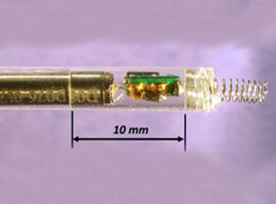USC Researchers Land $1 Million NIH Grant To Develop Pacemaker For Unborn Babies
SC CTSI support helped researchers build functional prototype that led to subsequent funding.
Note: Two SC CTSI programs, the Preclinical Translation and Regulatory Support program and the Pilot Funding program, supported some of formative work to build the functional prototype that led to subsequent funding from the NIH.
A team of researchers from the Keck School of Medicine of USC, Children’s Hospital Los Angeles (CHLA) and the USC Viterbi School of Engineering has landed a three-year, $1 million grant from the National Institutes of Health to help them develop a tiny pacemaker for unborn babies with a potentially fatal heart problem called fetal heart block.
“We needed this funding to move our research forward so we’re pretty excited,” said Yaniv Bar-Cohen, MD, associate professor of pediatrics at the Keck School and director of cardiac rhythm devices at CHLA, who is one of the principal researchers on the project.

This project got off the ground when Ramen Chmait, assistant professor of clinical obstetrics and gynecology at the Keck School, contacted Bar-Cohen to discuss fetal heart block, a condition that causes an extremely slow heart rate, which may not be adequate to sustain the circulation. They decided they wanted to build a small pacemaker and initially approached pacemaker manufacturers about collaborating with them, but they all declined due to the small initial market.
They got over that initial hurdle by searching for help at their home institution. Another colleague from USC introduced them to Gerald Loeb, a professor of biomedical engineering, who turned out to be the answer to their problem.

“We were hunting for a bioengineer and we found Dr. Loeb right here and he was the perfect fit,” said Chmait. Loeb, although a professor of engineering, is also a trained surgeon who conducts research on bionics and has extensive experience building medical devices.
Read more on USC.edu



